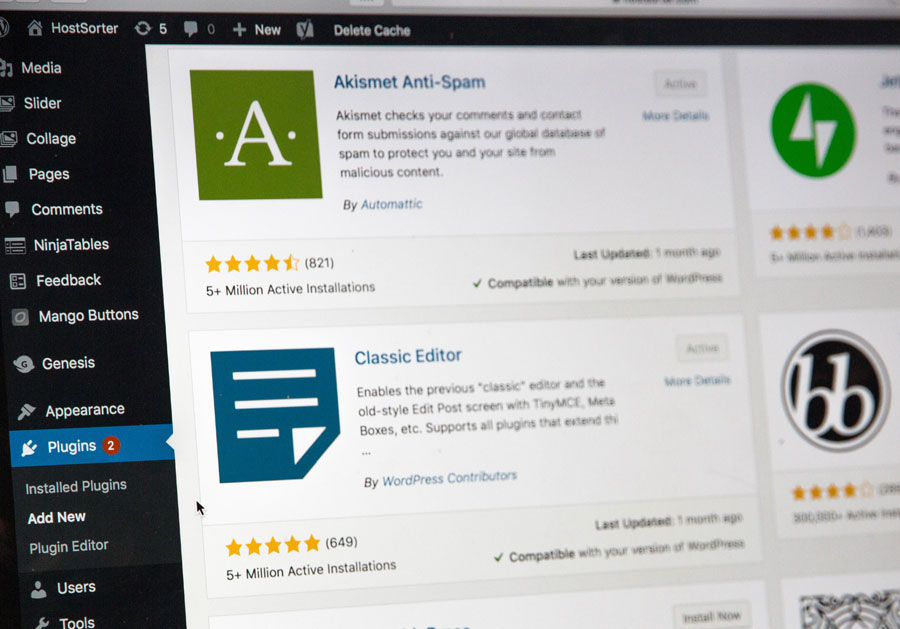Some WordPress features that serve to improve or tweak your website can actually make it insecure
WordPress is full of cool and nifty features, tools, plugins and widgets that can make your site unique and appealing. It’s one of the reasons WordPress is considered the best content management system of all time – after all, it powers more than 25% of the Internet!
However, some of the features that serve to improve or tweak your website can actually make it insecure.
In this overview, we’re looking at some of the most commonly used features that actually lower security levels for your visitors, along with advice on how to tackle these issues.
SSL Certificate Issues
If you don’t have an SSL certificate already, it’s high time you get one: it will encrypt all the data on your site and give it the SEO holy grail of links with the https prefix. However, many hosting plans now come with SSL certificates included, so chances are you already have one.
“SSL certificates are not only important for security but also for your search engine rankings. Given that there are many insecure sites that phish for user data, Google and other search engines will always prefer those sites that are using security tools”, says Sarah Mackenzie, a writer and marketer at WriteScout.
If you obtained an SSL certificate and activated it, it doesn’t mean that things can’t go wrong down the road. If you changed some of the master settings on your WordPress site, your SSL certificate might get tumbled up in the process, especially if you used an SSL certificate activator plugin.
Shady Plugins
Plugins are simply amazing – they allow you to turn your website into basically anything you can imagine. They are one of the main reasons why users adore WordPress.
Here are some of the best plugins and tools that WordPress users love: MonsterInsights (integration with Google Analytics, so you can track your audience within the WP dashboard), BeGraded (writing platform for outsourcing your post creation process), Yoast SEO (plugin that helps you rank better in search engines by analysing the SEO-friendliness of your content), Studyker (essay writing service that can help you with WordPress posts) and Typeform (to create beautiful, clean-looking contact forms, quizzes and other interactive content).
These are just some of the best tools and plugins that millions of users utilise on a daily basis, but unfortunately, it’s not all sunshine and rainbows. Next to amazing, helpful apps, plugins and tools, there are also those that contain malware and can make your website insecure.
To avoid this, always check the reputation of the tool publisher and make sure you’re downloading and installing it to your WordPress dashboard from a reputable source. If it’s a WordPress plugin, you can always check its ratings and reviews in the WP Plugin library.
The Login Dashboard
As you already know, the login dashboard for all WordPress sites looks the same. It’s a basic web page where users enter their email, along with the password associated with it. Of course, there’s also a Lost Password section, where users can obtain a reset password request via email.
This makes WordPress Admin login areas susceptible to hacking attacks. First of all, if someone knows that your site is run on WordPress (which can be easily checked), they can simply enter your URL + /wp-admin to access the admin login area.
There are two ways you can solve this security threat:
- Change your admin login URL: /wp-admin or /admin are just too easy to guess. If you want your admin login area to be less accessible to other people, use a custom URL that will work only for your site (such as URL.com/this-is-where-i-login).
- Block brute force login attempts: another insecure WordPress feature is that someone who wants to enter your admin dashboard can do so with brute force (i.e. trying out hundreds of different passwords without being blocked or banned). You will have to block this feature in your WordPress settings, but remember, it will also apply to your login attempts!
Tackling Safety Blindspots with Online Tools and Plugins
There is a whole army of WordPress experts and enthusiasts working hard to keep the platform secure and stable. They usually provide these features in the form of free plugins and online tools that help keep WordPress safe from hackers, spammers and other security threats.
So, if you’re worried about your WordPress site becoming insecure, here are some of the tools that you can use to prevent that:
- Akismet – the most popular WordPress plugin for tackling spammers
- Top Essay Writing – a writing services platform where you can find writers to help you produce high-quality, SEO-friendly content
- All in One WP Security and Firewall – an all-around solution for taking care of your WordPress site security in the form of a WP plugin
- Classy Essay – writer platform for hiring WordPress post writers
- Jetpack – a plugin that recognises safety and technical glitches that slow down your site and help make it load and perform faster
Remember, managing a WordPress site is always easier with the help of plugins and tools, so any security breach that happens can be downplayed by another app! It’s just important to catch in time and know how to make the necessary moves.
Conclusion
WordPress is an amazing website publishing platform that allowed millions of people, businesses and organisations to present their work on the Internet. However, it’s not just a happy place: like everything else on the Internet, there can be security threats.
As a WordPress website owner, not only do you have the task of managing your site, publishing content and marketing it, but you also have to uphold the promise that your site is safe and stable. That’s why you need to watch out for the most common WP features that can make your site insecure that we have outlined above.
Bio
Nicole D.Garrison is a content strategist and writer at Subjecto and Pick The Writer, as well as a contributor at a number of platforms for marketing specialists. She is a dedicated and experienced author who pays particular attention to quality research. In her free time, Nicole is a passionate runner and a curious beekeeper. Moreover, she runs her own blog LiveInspiredMagazine.





